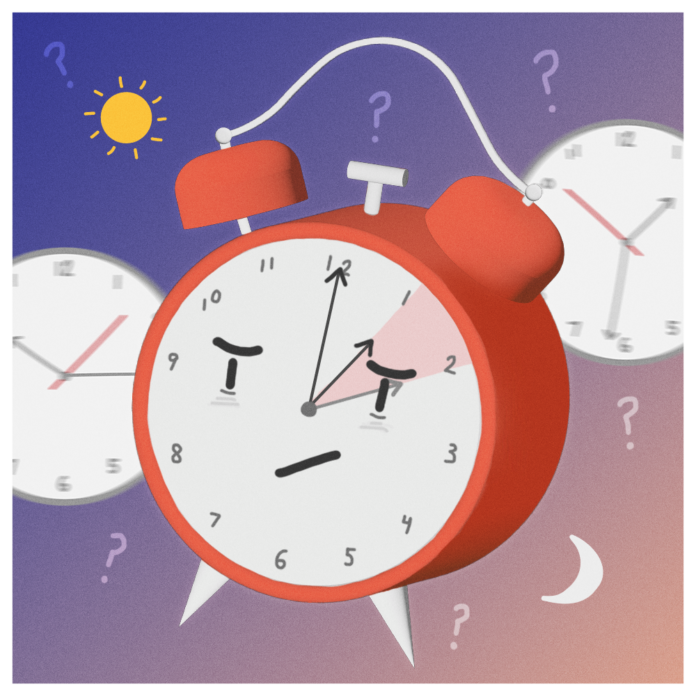The onset of winter can worsen one’s productivity; here’s how to not let it
By Abhinaya Kasagani— akasagani@ucdavis.edu
I am not being hyperbolic, nor am I laughing when I say that the onset of winter has dampened all festivities. I am one to enjoy the cold — maybe even prefer it — yet, every year, I forget about daylight savings and the sun begins to set, taking with it all my will.
The sunset never throws a tantrum nor postpones its cruel, inevitable descent. Time waits for no one. What remains waiting in a dusty corner is a pile of work just about due. I am less productive, less inclined to desire productivity and, by the time I come around to the idea of work, it is dark out. While daylight savings time gets blamed for this, the issue has more to do with our biology and habits.
This is because the change in time disrupts our circadian rhythms, which are closely tied to natural light, causing sleep deprivation and reduced focus levels. The productivity conundrum of shorter days often leads to decreased energy and fatigue, changes in sleep or appetite and difficulty concentrating. This misalignment of our internal clocks makes even the simplest of tasks feel monumental: our bodies now interpret the dark as a signal to wind down. One may also associate the setting sun with the end of the day, even if several productive hours remain. This association can lead to procrastination and a diminished willingness to engage in physical or creative pursuits. One does not fail to address the paradox — an hour once gained is an hour eventually lost.
It is human nature to blame this lack of energy on an external problem. One might argue that daylight savings time, introduced to maximize evening light during warmer months, often exacerbates the effects of this shift. It can feel as though our days are shrinking, and even though this is temporary, our bodies take time to adjust.
While daylight savings time worsens the cruelty of winter and adds to the list of its many downsides, there are still some benefits (however hidden). This change was originally implemented to reduce energy consumption by decreasing the need for artificial lighting during warmer months. Longer hours of daylight encouraged outdoor activities that, in turn, benefitted several industries, including retail, food service and tourism. It also aligned with societal patterns that prioritized evening activities over early morning ones, extending usable daylight that better fit the rhythm of daily life.
While nothing can be done to change this, we’ve established before that winter is manageable. There are practical ways to combat this disillusionment. For one, we can strategically plan our schedules to maximize natural daylight and tackle high-priority tasks early in the day, when our brains are more alert. Adjusting your workspace to include more light sources also helps maintain productivity and well-being. I’ve always resorted to taking midday breaks outside, when the sun is still around, tricking my mind into thinking all is right in the world. With these solutions, consistency is key. Winter has already disrupted our circadian rhythms, so it is crucial to stick to a routine to regulate our bodies and energy levels.
To aid in adjusting to lost evenings — time once spent outside — it is crucial that we reclaim moments of joy, however we see fit. It is a season of adjustment, of finding ways to stay productive, whether through creative activities such as reading, writing and crafting or physical exercise. If this still feels overwhelming to plan, think of it like this: Winters are taxing on both the mind and body.
Split these pursuits into two parts of your day. Mornings are for work and moving your body; the opportunity has presented itself to you. Physical activity releases endorphins that help you feel more energized, regardless of time or place. Evenings, on the other hand, are for relaxation. Plan for activities that enrich and fulfill you, like reading, yoga or working on another hobby. These needn’t take up much of your time; the goal is to avoid succumbing to the weather and to instead adapt. Make time for nourishing meals, for friendships and for meditative practices to ground yourself.
The cruelty of early sunsets can feel limiting, but it also offers us a unique opportunity to reflect and create. Small, strategic changes can help embrace the slowness and value that winter offers. And if this hasn’t yet convinced you, remind yourself of this: only 106 days until spring!
Written by: Abhinaya Kasagani— akasagani@ucdavis.edu
Disclaimer: The views and opinions expressed by individual columnists belong to the columnists alone and do not necessarily indicate the views and opinions held by The California Aggie.









